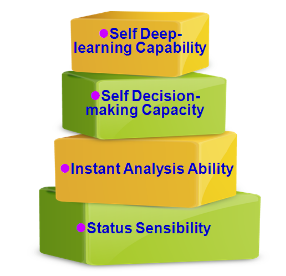By Belunn Se, senior industry observer based in Shenzhen, Guangdong province, China
On May 26, 2017, China International Big-data Industry Expo opened in Guiyang, the minister of the Ministry of Industry and Information Technology (MIIT), Miao Wei had read a congratulatory letter from Chinese Premier Li Keqiang.

Minister Miao Wei, reading Premier Li Keqiang's congratulatory letter at the opening ceremony Photo/ Internet
In his letter, Premier Li pointed out: "A new round of technological revolution and the industrial revolution is sweeping the globe, the new technology of Big Data, Cloud Computing, IoT (Internet of Things), Artificial Intelligence, Block Chain continue to emerge, the digital economy is profoundly changing the human production and life style, while a new economic growth momentum becomes increasingly prominent."
He added, "The Chinese government pays high attention to development of the digital economy, adheres to further pushing forward innovation driven development strategy. integrates 'mass entrepreneurship and innovation’ with strategy of buidling China into a cyber power, national Big-Data strategy, Internet + action plan and Made in China 2025 etc., to boost economic restructuring & upgrading and continuous social progress."
Promoting development towards middle-high end

IoT ecosystem in 3 Dimensions (Scenario, Industry Chain, Standard)
Smart Plant (IIoT, Industrial Internet of Things) is a critical part of IoT in the plant scenario. No matter for industrial 4, industrial Internet, or Made in China 2025, its core idea is to promote the manufacturing industry towards digitalization, networking and intellectualization that is Intelligent Manufacturing.
Considering their short-term and long-term financing balance, enterprises would invest in a new growth momentum. Hence, they would benefit from industry upgrading driven by Intellectual Manufacturing, which could bring about efficiency enhancement and quality improvement.
Meanwhile, through reforming and innovation, technology would impact business mode upgrading, or even value chain re-balancing. This could bring new advantages to "Made in China" and would promote the development towards a middle-high end.
Emerging technologies speeding up Intellectual Manufacturing
The new technologies of IoT, Big Data, Cloud Computing, Artificial Intelligence, Block Chain etc., are emerging in an endless stream with each passing day, showing a variety of features of intelligence, globalization, networking and green development.
The IoT connection infrastructure foundation, NB-IoT, one of the vital Low Power Wide Area Network (LPWAN) communication technologies, is taking a leading role in the energy saving and in-depth coverage technology, so it can provide 5 to 7 times coverage compared with previous traditional cellular network technologies.
The user terminal’s battery life can reach up to 10 years, with an extra advantage of great penetration ability, particularly suitable to meet in depth coverage, such as the underground parking lots, water meters and electric meter reading or remote machine connections, etc.
In 2017, the IoT industry chain, including the 3 Chinese Telecommunication Operators, had ushered in huge development opportunities and market potential via a launched NB-IoT network.
In recent months, NB-IoT critical elements such as Huawei’s chipset, module got ready for mass production. NB-IoT development is accelerating promotion of the whole industry from the Telecommunication operators, equipment manufacturers, to chip and module developers.
In the Intellectual Manufacturing sector, IIoT is a complicated systematic deployment including IIoT Network, Cloud Platform, Big-data, Security etc., which must develop collaboratively.
When industry competition is more evolved into the competition of the ecological chain, multinational companies are speeding up the pace of integration on industrial chain resources around the cloud based IoT operating system, aiming to take up a dominant position in the industry ecological competition.
GE, working with Intel, IBM, CISCO, AT&T etc., built an Industry Internet Alliance in 2014, and established four cloud computing centers in the western and eastern parts of America, as well as in Europe and Japan. In 2016, GE launched a global industrial cloud platform based on the Predix platform.
China's manufacturing enterprises also launched a series of domestic-developed industrial cloud platform, such as Haier's COSMO platform, Sany iRootech's RootCloud platform etc., which have eased cyber security concerns.
Moreover, via the CPS' integration of Human + Physical + Virtual, on the hardware aspect, more cost-effective and advanced chipsets, sensors are developed for machines; on the software aspect, advanced algorithm and continuous iteration of technologies, such as deep-learning and AI, are enhancing machine’s intelligence level higher and higher from bottom to top.

Machine Intelligence Level
All of these are leading the change of the production mode, influencing the configuration of global production factors, production mode and organization mode as well.
2017 Intellectual Manufacturing directions & international cooperation
MIIT had recently announced, 2017 industrial transformation and upgrading (Made in China 2025) funding will support four major directions:
-Intellectual Manufacturing comprehensive standardization and new mode application;
-Strengthening the Industrial Foundation Implementation Plan;
-Green manufacturing system integration;
-First set of major technical equipment insurance compensation;
MIIT also decided to organize the 2017 Sino-German Intelligent Manufacturing pilot demonstration cooperation including 4 aspects: Industrial Cooperation, Cooperation in the Standardization, Talents Training and Cooperative Industrial Park.
Manufacturing 2020
China regards innovation as the first development driving force constructing the innovation system of manufacturing industry, counts on industrial restructuring as the primary task to accelerate construction of the modern industrial system, and takes coordinated development as an important direction to promote industrial transformation and industrial agglomeration development.
Upon 2020, China is expected to improve the Popularity Rate of Digital Workshop and Smart Plant in the key areas of manufacturing industry up to over 20%.

Belunn Se, senior industry observer based in Shenzhen, Guangdong province, China
(The opinions expressed here do not necessarily reflect the opinions of Panview or CCTV.com)

Panview offers a new window of understanding the world as well as China through the views, opinions, and analysis of experts. We also welcome outside submissions, so feel free to send in your own editorials to "globalopinion@vip.cntv.cn" for consideration.















